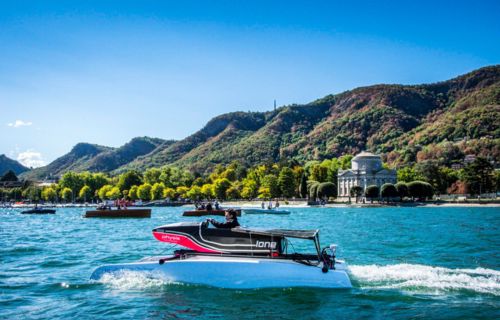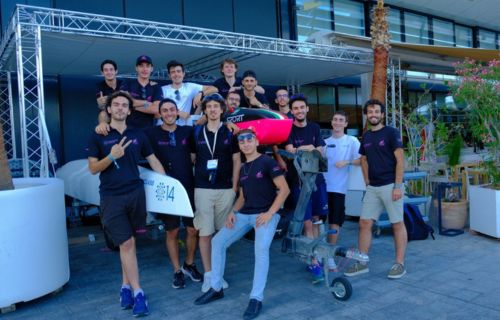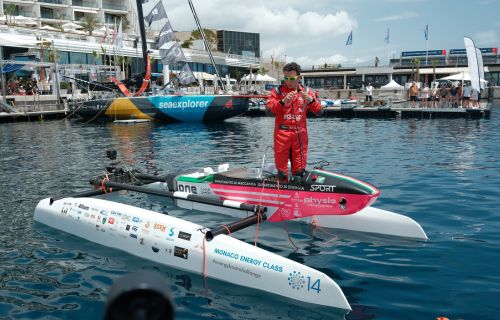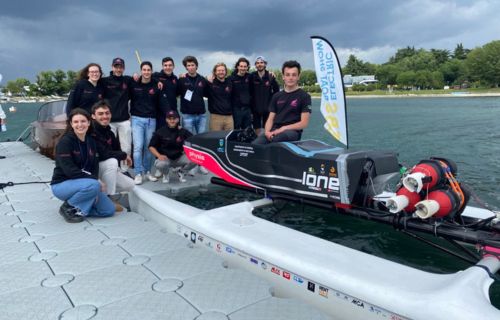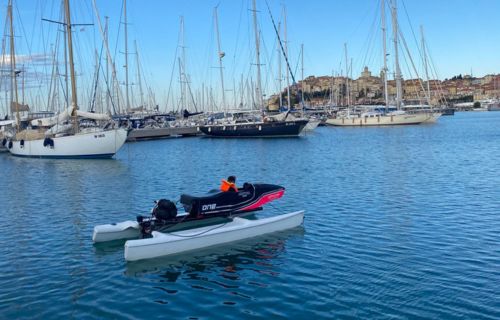Monaco Energy Boat Challenge
Monaco Energy Boat Challenge is an international nautical design competition with a focus on innovation and eco-sustainability. Students explore new green technologies and design a cockpit with an integrated energy system that can be hooked up to the bimaran provided by the organisers. The boats compete at Monaco Yacht Club. The competition is divided into three categories: Energy, Solar and Open Sea; the team of Politecnico di Milano participates in the Energy category, which includes three races: endurance, speed and manoeuvrability.
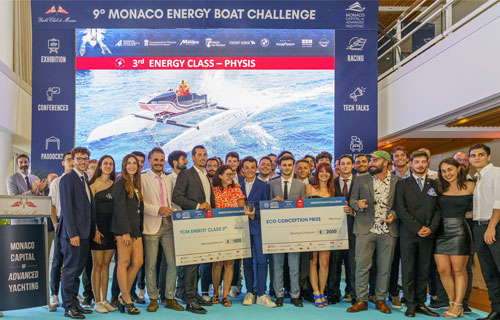
Physis PEB (Polimi Energy Boat) was created in September 2021 by the intuition of professors Paolo Schito (Department of Mechanics) and Riccardo Mereu (Department of Energy). Today, the group consists of over 90 engineering and design students in 7 departments (Energy, Powertrain, Structure, Dynamics&Control, Electronics, Logistic, Communication). To ensure zero emissions and high performance for its catamaran, Physis PEB is developing a hybrid propulsion system, combining hydrogen, solar panels and batteries.
Recruiting
The team organises recruiting sessions twice a year: in September/October and in March. Anyone wishing to join the Team must apply via the form available on the team's website.
Let's meet the team!
Hello! Can you tell us what Physis PEB is?
PEB stands for 'Polimi Energy Boat': we are a team of Politecnico students, established in autumn 2021 with the aim of building a 100% environmentally sustainable boat. Back in July 2022 we took part in the Monaco Energy Boat Challenge, the competition annually held in Monte Carlo between boats designed to minimise environmental impact while maintaining nautical performance.
Ready to compete in so few months?! That's an amazing result!
Yes, but taking pole position right away has even been more rewarding! We’ve given the reigning champions a run for their money in the race. And then, we ranked third in our debut race... Can you imagine? We are from Milan, a city with no sea, no big rivers or a lake to test in! We certainly looked like 'runaways' in Monte Carlo.
Can you explain how your team is organised?
It is made up of about 60 people from the most diverse Politecnico programmes. There are students from Mechanical Engineering, Aerospace, Aeronautics, Energy, Mathematics... but also Communication Design and Product Design. We are organised in 6 units: 4 technical units (structures, powertrain, energy, electronics) and 2 business units (communication, logistics and business). We try to work as much as possible face-to-face to encourage team building and share ideas.
Each unit usually meets every week; the practical tests are accompanied by a great deal of work on drawing up safety documents, which is something we must always pay close attention to if we want to avoid running any kind of risk when sailing.
That’s a big commitment! Isn't it difficult to reconcile it with studying?
We try to be students first and team members later, but actually... managing not to get totally absorbed in the project is not always so easy. What drives us, however, is curiosity, the desire to put into practice what we study in the classroom, to develop new knowledge directly in the field. What makes us forget fatigue is the fun of each day spent together in the workshop, where the team is no longer a group of people to work with, but becomes a group of friends to talk to.
Looking to the future, what are your next goals?
Winning the Monaco Energy Boat Challenge of course! The main effort in the near future will be to further develop our catamaran's hybrid propulsion system, which combines hydrogen and batteries. In the longer term, we are also trying to develop an autonomous vessel guidance system.
Let's conclude with the reasons why you would recommend a new student to join your team...
First of all, the fact of working in a team itself. It is a first approach to what the world of work will be: you learn to manage the dynamics with other people, to compare different points of view.
Then, being able to put into practice what is studied in the classrooms, designing and experimenting in the field with innovative and sustainable solutions, feeling free to innovate... All of this is refreshing. In Monte Carlo, for example, we brought propellers we had produced ourselves with a 3D printer, instead of bronze ones as is usually done, and these were appreciated by many insiders.


